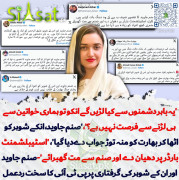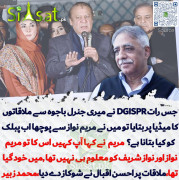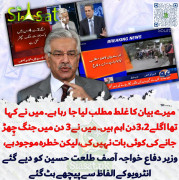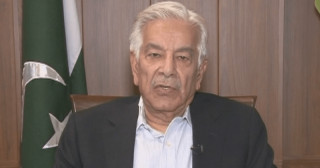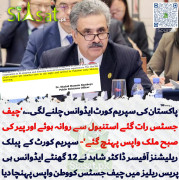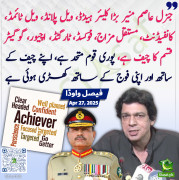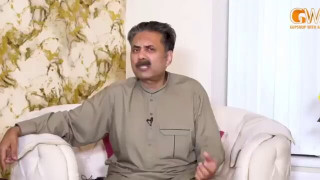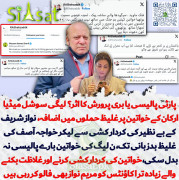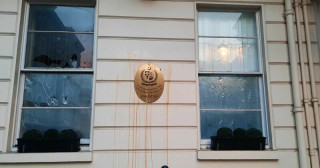M Ali Khan
Minister (2k+ posts)
“He Is Trying to Play a Very Difficult Game”: The Once and Future Imran Khan
After a hard-partying life as a cricket star and sex symbol, Pakistan’s prime minister has transformed himself from revered sportsman into international statesman. Now, as he seeks to navigate the crisis over Kashmir, Khan remains torn between his years as an Oxford-educated playboy and his growing role as a critic of Western decadence.
By Aatish Taseer
September 12, 2019

DEFENDER OF THE FAITH. Imran Khan in 2012, at his home in Islamabad. “The next time you come to Pakistan,” he told friends, “I will be prime minister.”
Photograph By Finlay Mackay.
One night the future first lady of Pakistan had a dream. Visions and prophecies were Bushra Maneka’s stock and trade, for she was a female pir, or living saint. Known as Pinky Peerni to her admirers, Maneka’s gift of clairvoyance had earned her a following well beyond her hometown of Pakpattan, a celebrated spiritual center 115 miles southwest of Lahore. In 2015, Maneka had added to her growing list of clients the man who was the object of her prophetic dream: Imran Khan, the legendary cricketer and most famous Pakistani alive. “Spiritual guides, or pirs,” Khan writes in his autobiography, “are quite common in Pakistan. Millions of people, particularly in rural areas of the country, follow them, consulting them on everything from religious matters to sickness and family problems.”
Khan was, if not a living saint, then certainly a living god. From the late 1970s, when my mother, a reporter in India, first interviewed him, to well into the 1990s, when he led the Pakistan team to a World Cup victory against England, he towered over the landscape of practically all those nations where the Union Jack had ever flown. Born in 1952 to an upper-middle-class family in Lahore, he had come of age at a time when cricket, the “gentleman’s game” so intimately associated with the spread of the British Empire, was turning into a blood sport, imbued with the tensions of a newly awakened postcolonial world. “For teams like Pakistan, India, and the West Indies,” Khan writes in his autobiography, “a battle to right colonial wrongs and assert our equality was played out on the cricket field every time we took on England.”
Into this gladiatorial arena, shirt open, eyes bedroom-y, hair long and tousled, stepped Khan. He was one of those rare figures, like Muhammad Ali, who emerge once a generation on the frontier of sport, sex, and politics. “Imran may not have been the first player to enjoy his own cult following,” writes his biographer Christopher Sandford, “but he was more or less single-handedly responsible for sexualizing what had hitherto been an austere, male-oriented activity patronized at the most devoted level by the obsessed or the disturbed.”
Arrestingly handsome and Oxford-educated, albeit with a third-class degree, Khan found the doors of the British aristocracy thrown open to him. Mark Shand, the brother of Camilla Parker Bowles, now the Duchess of Cornwall, was among his best friends; he was seen out on the town with Jerry Hall and Goldie Hawn; if his second wife, the television personality Reham Khan, is to be believed, he took part in a threesome with Grace Jones. The man who shunned the label of “playboy”—“I have never considered myself a sex symbol,” he told my mother in 1983—nonetheless left a long line of Khan-quests from Bollywood to Hollywood, with a pit stop in Chelsea, where his flat, with its tented ceilings of gold silk, was one part harem, one part bordello. “He had a lot of women in his life,” my uncle, Yousaf Salahuddin, one of Khan’s best friends and a cultural institution in his own right, told me recently in Lahore, “because he was a very wanted man. In India, I have seen women from the age of just 6 to 60 going crazy over him.” In 1995, at age 43, Khan married Jemima Goldsmith, the daughter of the tycoon Jimmy Goldsmith, who is said to have presciently remarked of his son-in-law, “He’ll make an excellent first husband.” As a teenager, I remember gaping over paparazzi photos of the newly wed couple, including some of them in flagrante on a balcony in Marbella. If the fascination with Khan’s sexual prowess was fetishistic in Britain, it was edged with racial pride in Pakistan. As Mohsin Hamid, the country’s most famous writer, told me in Lahore, “Imran Khan was a symbol of emancipatory virility.”
In the mid-1990s, there was not a cloud on Khan’s horizon. He had won the World Cup; he had married an alluring social beauty; he had, in memory of his mother, who died of cancer in 1985, opened Pakistan’s first hospital dedicated to the treatment of that disease. It was a massive philanthropic gesture and the crowning achievement of a life showered with gifts. At that juncture, it might well have been asked what a clairvoyant from a small town in Pakistan had to offer Khan that he didn’t already have.
The short answer is politics. In 1996, after years of turning down pleas from established politicians and military dictators eager to align themselves with his celebrity, Khan launched his own political party. In its first election, the Pakistan Tehreek-e-Insaf party, or PTI—which translates as the Movement for Justice—won zero seats in parliament. Five years later, Khan won one seat, his own. Even by 2013, with his personal popularity at an all-time high, the PTI won only 35 seats. For 20 years, he had been telling his friends and well-wishers that “the next time you come to Pakistan, I will be prime minister.” But four elections had come and gone, two marriages had collapsed in their wake, and the quest of this aging playboy to be his country’s premier was no nearer its end.
It was then, or not long after, that Bushra Maneka had her dream.

TIGER’S LAIR. Khan, circa 1990. In Pakistan, his sexual conquests made him “a symbol of emancipatory virility.”
Photograph By Terry O’neill/Iconic Images/Getty Images.
Khan, like a real-world version of Stannis Baratheon desperately consulting the Red Woman in Game of Thrones, had begun to see Pinky for “spiritual guidance.” The clairvoyant’s usual fee for making the impossible possible, a senior media figure in Karachi told me on condition of anonymity, was great vats of cooked meat. These, he explained, over a Japanese meal, she fed to the jinns she kept at her disposal.
“Jinns?” I asked, wondering if I had misheard.
“She has two jinns,” the media man said, serving me some more soba noodles.
Then he came to the surreal story that is on the lips of everyone in Pakistan, from senior diplomats and ministers to journalists and entertainers. Although Maneka has dismissed it as mere rumor, the story has attained the status of fable—a supernatural tale that seeks to illuminate a deeper truth. Once Maneka had her prophetic vision, the media veteran told me, no amount of cooked meat would suffice to fulfill Khan’s ambition. The voice in her dream was clear: If Imran Khan was to be prime minister, it was imperative he be married to the right woman—i.e., a member of Maneka’s own family.
n one version of this torrid tale, Maneka offered her sister to Khan. In another, it was her daughter. Either way, Khan demurred. Then Maneka went away to dream again. This time, however, she was no bystander to someone else’s vision. The voice in her head told her that she, Bushra Maneka, a married woman and a mother of five, was the wife Imran Khan needed. What Maneka now wanted from Khan was what every woman had ever wanted from him: She wanted him.
Khan had never set eyes on Maneka, for she consulted her followers from behind a veil. But this time, he acceded to her vision. The stars aligned and Maneka’s husband, a customs official, agreed to give her a divorce, praising Khan as a “disciple of our spiritual family.”
In February 2018, cricketer and clairvoyant were married in a private ceremony. Six months later, Imran Khan was elected prime minister of Pakistan, and Pinky Peerni, a character who would stretch the limits of Salman Rushdie’s imagination, was its first lady.
On the burning hot morning in April when my flight landed at Allama Iqbal International Airport in Lahore, I asked a man with a thickly dyed mustache sitting next to me whether I needed to fill out an entry card. “This is Imran Khan’s Pakistan!” he responded enthusiastically. Khan had promised “a new Pakistan,” and presumably one feature of this utopia, my seatmate implied, is that nobody has to fill out tiresome paperwork anymore.
Khan, both as candidate and prime minister, sounds like populists everywhere, now inveighing against Westernized “dollar-addicted” elites, now promising to fix the problems of one of South Asia’s slowest-growing economies by bringing home magical amounts of black money squirreled away in foreign bank accounts. But as much as his rhetoric resembles that of other populists—from Narendra Modi next door in India, to Erdogan in Turkey and Bolsonaro in Brazil—there is one important difference: Khan is not of the people. If anything, he belongs to an elite even more glamorous and rarefied than the one he routinely attacks. As he said himself, in an article he wrote for Arab News in 2002, “I was smoothly moving to becoming a pukka brown sahib”—a colonial term denoting a native more English than the English. “After all,” he added, “I had the right credentials in terms of school, university, and, above all, acceptability in the English aristocracy.” Unlike other populists in the developing world, Khan is a man guessing at the passions of people he does not actually represent. Like Trump or the Brexiteers, he underwent a Damascene conversion, which, as he wrote, caused him to turn his back on “brown sahib culture” and throw in his lot with the “real Pakistan.”
The man after whom the airport in Lahore is named was easily the single greatest influence in Khan’s transformation from louche fixture of the demimonde to political revolutionary. Sir Muhammad Iqbal, a poet and philosopher, died in 1938, a decade before the founding of Pakistan. But it was he who, in 1930, had first seriously made the case for why Muslims living in British India needed a homeland like Pakistan, where they could realize their “ethical and political ideal.” What seems to have struck Khan hardest about Iqbal’s philosophy was his idea of khudi, or selfhood, which Khan understood to mean “self-reliance, self-respect, self-confidence.” It was precisely what Pakistan needed, Khan thought, to banish the shame of colonial rule and to regain its sense of self. It would also, he believed, armor Pakistan against its own elites, whose “slavish” imitation of Western culture had instilled in them a “self-loathing that stemmed from an ingrained inferiority complex.”
Indeed, it is Khan’s extensive personal experience of what he now condemns as Western decadence that enables him to rail against it so authoritatively. “An emotion that he feels very strongly about is that we should stop feeling enslaved to the West mentally,” said Ali Zafar, Khan’s friend and Pakistan’s biggest pop star. “He feels that since he’s gone there—he’s been there and done that—he knows the West more than anybody else over here. He’s telling them, ‘Look, you’ve got to find your own space, your own identity, your own thing, your own culture, your own roots.’ ”
During the weeks I spent reporting this piece in Pakistan, I made repeated attempts to reach out to the prime minister, but his political handlers seemed alarmed at the prospect of resurrecting his past in the pages of a glossy magazine. In 2000, Khan, then married to Jemima, had been the subject of a profile in VANITY FAIR that focused on his youthful escapades. When I spoke to Zulfi Bokhari, a frequenter of nightclubs from the London days who is now a junior minister in Khan’s government, he sought assurances that my piece would be positive; otherwise, he told me, it would be his ass on the line. A few days later, Bokhari WhatsApped me: “Unfortunately the PM has said he can’t do it right now. Perhaps in the near future.”
I first spoke with Khan at a party in London, when I was 25. At the time I was dating Ella Windsor, a minor member of the British royal family who was a family friend of the Goldsmiths. To see Khan out and about in London—the legend himself—was to understand how truly at home he was among the highest echelons of British society. The English upper classes adore cricket—it is one of the many coded ways in which their class system works—and the allure of the former captain of the Pakistani cricket team was still very real. The night we met, in late summer 2006, Khan had come to a party at a Chelsea studio overlooking the Moravian burial ground. On that balmy evening, surrounded by the silhouettes of plane trees, it was clear that Khan, five years after 9/11, was in the throes of a religious and political transformation. I was researching my first book, Stranger to History: A Son’s Journey Through Islamic Lands, and had only just returned from an eight-month trip through Syria, Yemen, Iran, and Pakistan. Khan’s views, though alarming in their intensity, struck me as juvenile. He said he believed that suicide bombers, according to “the rules of the Geneva Convention,” had the right to blow themselves up. Here, I remember feeling, was a man who had dealt so little in ideas that every idea he had now struck him as a good one.
The next time I met Khan was under dramatically altered circumstances. In December 2007, I was staying with my uncle Yousaf in his house in the old city of Lahore, when televisions across the country began to flash the news that Benazir Bhutto, the former prime minister, had been assassinated. It was deeply affecting, even for those who disliked Bhutto, to see this tarnished but enduring symbol of hope and democracy cut down so violently. Upon her death, Pakistan, battered by terror and military dictatorship, descended into paroxysms of grief. Into this atmosphere Khan arrived a few days later with a French girlfriend. He had been in Mumbai, staying at the house of a prominent socialite, where he had been photographed poolside in swimming trunks as his country was engulfed in trauma.
Unlike other populists, Khan belongs to an elite even more rarefied than the one he attacks.
Khan has a commanding presence. He fills a room and has a tendency to speak at people, rather than to them; never was there a greater mansplainer. What he lacks in intelligence, however, he makes up for in intensity, vigor, and what feels almost like a kind of nobility. As Wasim Akram—Khan’s protégé and his successor as captain of the Pakistan team—said to me in Karachi, “There are two types of people, the followers and the leaders. And he is definitely a leader. Not just in cricket—in general.” To describe Khan as Im the Dim, as he has long been known in London circles, fails to capture what it feels like to be around him. “You might say he’s a duffer; you might say he’s a buffoon,” his second wife, Reham, told me over lunch in London. “He doesn’t have intelligence of economic principles. He doesn’t have academic intelligence. But he’s very street, so he figures you out.” Like his coeval in the White House, Khan has been reading people all his life—on and off the field. This knowing quality, combined with the raw glamour of vintage fame, creates a palpable tension in his presence. The air bristles; oxygen levels crash. The line is taut, if no longer with sex appeal, then its closest substitute: massive celebrity.
I had been less aware of this when I first met Khan in London. But to see him two years later in the old city of Lahore, doing more dips in the gym at 55 than I could do at 27, watching him fawned over by young and old men alike, was to feel myself in the company of a demigod. Alone with him, I was struck by that mixture of narcissism bordering on sociopathy that afflicts those who have been famous too long. His utter lack of emotion when it came to Bhutto—whom he had been at Oxford with, and had known most of his life—was startling. “Look at Benazir,” he told me as we drove through Lahore one morning, past knots of mourners and protesters. “I mean, God really saved her.” Then he began fulminating against Bhutto for having agreed to legitimize General Pervez Musharraf, Pakistan’s military dictator, in return for the government dropping corruption charges against her.
“Imagine that,” Khan said. “It’s the most immoral thing you could have done. So this thing has come as a blessing for her.”
“This thing?” I asked.
“Death,” he said matter-of-factly. Then, with what sounded almost like envy, he added, “Benazir has become a martyr. She has become immortal.”

STICKY WICKET. Khan has played to both sides of what he calls the “competing cultural forces in my life.” As a young man in Pakistan, 1971 and with Pashtun tribesmen, 1995.
Top, from S&G/PA Images/Getty Images; bottom, by Paul Massey/Camera Press/Redux.
After a hard-partying life as a cricket star and sex symbol, Pakistan’s prime minister has transformed himself from revered sportsman into international statesman. Now, as he seeks to navigate the crisis over Kashmir, Khan remains torn between his years as an Oxford-educated playboy and his growing role as a critic of Western decadence.
By Aatish Taseer
September 12, 2019

DEFENDER OF THE FAITH. Imran Khan in 2012, at his home in Islamabad. “The next time you come to Pakistan,” he told friends, “I will be prime minister.”
Photograph By Finlay Mackay.
One night the future first lady of Pakistan had a dream. Visions and prophecies were Bushra Maneka’s stock and trade, for she was a female pir, or living saint. Known as Pinky Peerni to her admirers, Maneka’s gift of clairvoyance had earned her a following well beyond her hometown of Pakpattan, a celebrated spiritual center 115 miles southwest of Lahore. In 2015, Maneka had added to her growing list of clients the man who was the object of her prophetic dream: Imran Khan, the legendary cricketer and most famous Pakistani alive. “Spiritual guides, or pirs,” Khan writes in his autobiography, “are quite common in Pakistan. Millions of people, particularly in rural areas of the country, follow them, consulting them on everything from religious matters to sickness and family problems.”
Khan was, if not a living saint, then certainly a living god. From the late 1970s, when my mother, a reporter in India, first interviewed him, to well into the 1990s, when he led the Pakistan team to a World Cup victory against England, he towered over the landscape of practically all those nations where the Union Jack had ever flown. Born in 1952 to an upper-middle-class family in Lahore, he had come of age at a time when cricket, the “gentleman’s game” so intimately associated with the spread of the British Empire, was turning into a blood sport, imbued with the tensions of a newly awakened postcolonial world. “For teams like Pakistan, India, and the West Indies,” Khan writes in his autobiography, “a battle to right colonial wrongs and assert our equality was played out on the cricket field every time we took on England.”
Into this gladiatorial arena, shirt open, eyes bedroom-y, hair long and tousled, stepped Khan. He was one of those rare figures, like Muhammad Ali, who emerge once a generation on the frontier of sport, sex, and politics. “Imran may not have been the first player to enjoy his own cult following,” writes his biographer Christopher Sandford, “but he was more or less single-handedly responsible for sexualizing what had hitherto been an austere, male-oriented activity patronized at the most devoted level by the obsessed or the disturbed.”
Arrestingly handsome and Oxford-educated, albeit with a third-class degree, Khan found the doors of the British aristocracy thrown open to him. Mark Shand, the brother of Camilla Parker Bowles, now the Duchess of Cornwall, was among his best friends; he was seen out on the town with Jerry Hall and Goldie Hawn; if his second wife, the television personality Reham Khan, is to be believed, he took part in a threesome with Grace Jones. The man who shunned the label of “playboy”—“I have never considered myself a sex symbol,” he told my mother in 1983—nonetheless left a long line of Khan-quests from Bollywood to Hollywood, with a pit stop in Chelsea, where his flat, with its tented ceilings of gold silk, was one part harem, one part bordello. “He had a lot of women in his life,” my uncle, Yousaf Salahuddin, one of Khan’s best friends and a cultural institution in his own right, told me recently in Lahore, “because he was a very wanted man. In India, I have seen women from the age of just 6 to 60 going crazy over him.” In 1995, at age 43, Khan married Jemima Goldsmith, the daughter of the tycoon Jimmy Goldsmith, who is said to have presciently remarked of his son-in-law, “He’ll make an excellent first husband.” As a teenager, I remember gaping over paparazzi photos of the newly wed couple, including some of them in flagrante on a balcony in Marbella. If the fascination with Khan’s sexual prowess was fetishistic in Britain, it was edged with racial pride in Pakistan. As Mohsin Hamid, the country’s most famous writer, told me in Lahore, “Imran Khan was a symbol of emancipatory virility.”
In the mid-1990s, there was not a cloud on Khan’s horizon. He had won the World Cup; he had married an alluring social beauty; he had, in memory of his mother, who died of cancer in 1985, opened Pakistan’s first hospital dedicated to the treatment of that disease. It was a massive philanthropic gesture and the crowning achievement of a life showered with gifts. At that juncture, it might well have been asked what a clairvoyant from a small town in Pakistan had to offer Khan that he didn’t already have.
The short answer is politics. In 1996, after years of turning down pleas from established politicians and military dictators eager to align themselves with his celebrity, Khan launched his own political party. In its first election, the Pakistan Tehreek-e-Insaf party, or PTI—which translates as the Movement for Justice—won zero seats in parliament. Five years later, Khan won one seat, his own. Even by 2013, with his personal popularity at an all-time high, the PTI won only 35 seats. For 20 years, he had been telling his friends and well-wishers that “the next time you come to Pakistan, I will be prime minister.” But four elections had come and gone, two marriages had collapsed in their wake, and the quest of this aging playboy to be his country’s premier was no nearer its end.
It was then, or not long after, that Bushra Maneka had her dream.

TIGER’S LAIR. Khan, circa 1990. In Pakistan, his sexual conquests made him “a symbol of emancipatory virility.”
Photograph By Terry O’neill/Iconic Images/Getty Images.
Khan, like a real-world version of Stannis Baratheon desperately consulting the Red Woman in Game of Thrones, had begun to see Pinky for “spiritual guidance.” The clairvoyant’s usual fee for making the impossible possible, a senior media figure in Karachi told me on condition of anonymity, was great vats of cooked meat. These, he explained, over a Japanese meal, she fed to the jinns she kept at her disposal.
“Jinns?” I asked, wondering if I had misheard.
“She has two jinns,” the media man said, serving me some more soba noodles.
Then he came to the surreal story that is on the lips of everyone in Pakistan, from senior diplomats and ministers to journalists and entertainers. Although Maneka has dismissed it as mere rumor, the story has attained the status of fable—a supernatural tale that seeks to illuminate a deeper truth. Once Maneka had her prophetic vision, the media veteran told me, no amount of cooked meat would suffice to fulfill Khan’s ambition. The voice in her dream was clear: If Imran Khan was to be prime minister, it was imperative he be married to the right woman—i.e., a member of Maneka’s own family.
n one version of this torrid tale, Maneka offered her sister to Khan. In another, it was her daughter. Either way, Khan demurred. Then Maneka went away to dream again. This time, however, she was no bystander to someone else’s vision. The voice in her head told her that she, Bushra Maneka, a married woman and a mother of five, was the wife Imran Khan needed. What Maneka now wanted from Khan was what every woman had ever wanted from him: She wanted him.
Khan had never set eyes on Maneka, for she consulted her followers from behind a veil. But this time, he acceded to her vision. The stars aligned and Maneka’s husband, a customs official, agreed to give her a divorce, praising Khan as a “disciple of our spiritual family.”
In February 2018, cricketer and clairvoyant were married in a private ceremony. Six months later, Imran Khan was elected prime minister of Pakistan, and Pinky Peerni, a character who would stretch the limits of Salman Rushdie’s imagination, was its first lady.
On the burning hot morning in April when my flight landed at Allama Iqbal International Airport in Lahore, I asked a man with a thickly dyed mustache sitting next to me whether I needed to fill out an entry card. “This is Imran Khan’s Pakistan!” he responded enthusiastically. Khan had promised “a new Pakistan,” and presumably one feature of this utopia, my seatmate implied, is that nobody has to fill out tiresome paperwork anymore.
Khan, both as candidate and prime minister, sounds like populists everywhere, now inveighing against Westernized “dollar-addicted” elites, now promising to fix the problems of one of South Asia’s slowest-growing economies by bringing home magical amounts of black money squirreled away in foreign bank accounts. But as much as his rhetoric resembles that of other populists—from Narendra Modi next door in India, to Erdogan in Turkey and Bolsonaro in Brazil—there is one important difference: Khan is not of the people. If anything, he belongs to an elite even more glamorous and rarefied than the one he routinely attacks. As he said himself, in an article he wrote for Arab News in 2002, “I was smoothly moving to becoming a pukka brown sahib”—a colonial term denoting a native more English than the English. “After all,” he added, “I had the right credentials in terms of school, university, and, above all, acceptability in the English aristocracy.” Unlike other populists in the developing world, Khan is a man guessing at the passions of people he does not actually represent. Like Trump or the Brexiteers, he underwent a Damascene conversion, which, as he wrote, caused him to turn his back on “brown sahib culture” and throw in his lot with the “real Pakistan.”
The man after whom the airport in Lahore is named was easily the single greatest influence in Khan’s transformation from louche fixture of the demimonde to political revolutionary. Sir Muhammad Iqbal, a poet and philosopher, died in 1938, a decade before the founding of Pakistan. But it was he who, in 1930, had first seriously made the case for why Muslims living in British India needed a homeland like Pakistan, where they could realize their “ethical and political ideal.” What seems to have struck Khan hardest about Iqbal’s philosophy was his idea of khudi, or selfhood, which Khan understood to mean “self-reliance, self-respect, self-confidence.” It was precisely what Pakistan needed, Khan thought, to banish the shame of colonial rule and to regain its sense of self. It would also, he believed, armor Pakistan against its own elites, whose “slavish” imitation of Western culture had instilled in them a “self-loathing that stemmed from an ingrained inferiority complex.”
Indeed, it is Khan’s extensive personal experience of what he now condemns as Western decadence that enables him to rail against it so authoritatively. “An emotion that he feels very strongly about is that we should stop feeling enslaved to the West mentally,” said Ali Zafar, Khan’s friend and Pakistan’s biggest pop star. “He feels that since he’s gone there—he’s been there and done that—he knows the West more than anybody else over here. He’s telling them, ‘Look, you’ve got to find your own space, your own identity, your own thing, your own culture, your own roots.’ ”
During the weeks I spent reporting this piece in Pakistan, I made repeated attempts to reach out to the prime minister, but his political handlers seemed alarmed at the prospect of resurrecting his past in the pages of a glossy magazine. In 2000, Khan, then married to Jemima, had been the subject of a profile in VANITY FAIR that focused on his youthful escapades. When I spoke to Zulfi Bokhari, a frequenter of nightclubs from the London days who is now a junior minister in Khan’s government, he sought assurances that my piece would be positive; otherwise, he told me, it would be his ass on the line. A few days later, Bokhari WhatsApped me: “Unfortunately the PM has said he can’t do it right now. Perhaps in the near future.”
I first spoke with Khan at a party in London, when I was 25. At the time I was dating Ella Windsor, a minor member of the British royal family who was a family friend of the Goldsmiths. To see Khan out and about in London—the legend himself—was to understand how truly at home he was among the highest echelons of British society. The English upper classes adore cricket—it is one of the many coded ways in which their class system works—and the allure of the former captain of the Pakistani cricket team was still very real. The night we met, in late summer 2006, Khan had come to a party at a Chelsea studio overlooking the Moravian burial ground. On that balmy evening, surrounded by the silhouettes of plane trees, it was clear that Khan, five years after 9/11, was in the throes of a religious and political transformation. I was researching my first book, Stranger to History: A Son’s Journey Through Islamic Lands, and had only just returned from an eight-month trip through Syria, Yemen, Iran, and Pakistan. Khan’s views, though alarming in their intensity, struck me as juvenile. He said he believed that suicide bombers, according to “the rules of the Geneva Convention,” had the right to blow themselves up. Here, I remember feeling, was a man who had dealt so little in ideas that every idea he had now struck him as a good one.
The next time I met Khan was under dramatically altered circumstances. In December 2007, I was staying with my uncle Yousaf in his house in the old city of Lahore, when televisions across the country began to flash the news that Benazir Bhutto, the former prime minister, had been assassinated. It was deeply affecting, even for those who disliked Bhutto, to see this tarnished but enduring symbol of hope and democracy cut down so violently. Upon her death, Pakistan, battered by terror and military dictatorship, descended into paroxysms of grief. Into this atmosphere Khan arrived a few days later with a French girlfriend. He had been in Mumbai, staying at the house of a prominent socialite, where he had been photographed poolside in swimming trunks as his country was engulfed in trauma.
Unlike other populists, Khan belongs to an elite even more rarefied than the one he attacks.
Khan has a commanding presence. He fills a room and has a tendency to speak at people, rather than to them; never was there a greater mansplainer. What he lacks in intelligence, however, he makes up for in intensity, vigor, and what feels almost like a kind of nobility. As Wasim Akram—Khan’s protégé and his successor as captain of the Pakistan team—said to me in Karachi, “There are two types of people, the followers and the leaders. And he is definitely a leader. Not just in cricket—in general.” To describe Khan as Im the Dim, as he has long been known in London circles, fails to capture what it feels like to be around him. “You might say he’s a duffer; you might say he’s a buffoon,” his second wife, Reham, told me over lunch in London. “He doesn’t have intelligence of economic principles. He doesn’t have academic intelligence. But he’s very street, so he figures you out.” Like his coeval in the White House, Khan has been reading people all his life—on and off the field. This knowing quality, combined with the raw glamour of vintage fame, creates a palpable tension in his presence. The air bristles; oxygen levels crash. The line is taut, if no longer with sex appeal, then its closest substitute: massive celebrity.
I had been less aware of this when I first met Khan in London. But to see him two years later in the old city of Lahore, doing more dips in the gym at 55 than I could do at 27, watching him fawned over by young and old men alike, was to feel myself in the company of a demigod. Alone with him, I was struck by that mixture of narcissism bordering on sociopathy that afflicts those who have been famous too long. His utter lack of emotion when it came to Bhutto—whom he had been at Oxford with, and had known most of his life—was startling. “Look at Benazir,” he told me as we drove through Lahore one morning, past knots of mourners and protesters. “I mean, God really saved her.” Then he began fulminating against Bhutto for having agreed to legitimize General Pervez Musharraf, Pakistan’s military dictator, in return for the government dropping corruption charges against her.
“Imagine that,” Khan said. “It’s the most immoral thing you could have done. So this thing has come as a blessing for her.”
“This thing?” I asked.
“Death,” he said matter-of-factly. Then, with what sounded almost like envy, he added, “Benazir has become a martyr. She has become immortal.”

STICKY WICKET. Khan has played to both sides of what he calls the “competing cultural forces in my life.” As a young man in Pakistan, 1971 and with Pashtun tribesmen, 1995.
Top, from S&G/PA Images/Getty Images; bottom, by Paul Massey/Camera Press/Redux.




